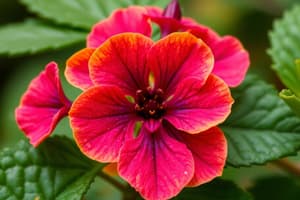Podcast
Questions and Answers
Vegetables are plants or parts of plants like leaves, fruits, tubers, roots, bulbs, stems, shoots, and flower used in a dish either raw or ______
Vegetables are plants or parts of plants like leaves, fruits, tubers, roots, bulbs, stems, shoots, and flower used in a dish either raw or ______
cooked
Vegetables provide nutrients vital for health and maintenance of your body. Eating vegetables provides health benefits to people like reduced risk of some chronic diseases including heart attack and stroke, protect them against certain types of cancers, reduce obesity and type two diabetes, lower blood pressure, reduce the risk of developing kidney stones and help decrease ______
Vegetables provide nutrients vital for health and maintenance of your body. Eating vegetables provides health benefits to people like reduced risk of some chronic diseases including heart attack and stroke, protect them against certain types of cancers, reduce obesity and type two diabetes, lower blood pressure, reduce the risk of developing kidney stones and help decrease ______
bone loss
Vegetables are important sources of many nutrients, including potassium, dietary fiber, folate, vitamin A and C. Dietary fiber helps reduce in blood cholesterol levels and may lower risk of heart disease. Fiber helps in reducing constipation and ______
Vegetables are important sources of many nutrients, including potassium, dietary fiber, folate, vitamin A and C. Dietary fiber helps reduce in blood cholesterol levels and may lower risk of heart disease. Fiber helps in reducing constipation and ______
diverticulosis
Folate helps the body form red blood cells. Vitamins A keeps eyes and skin healthy and helps to protect against infections. Vitamins C helps heal cuts and wounds, and keeps teeth and gums ______
Folate helps the body form red blood cells. Vitamins A keeps eyes and skin healthy and helps to protect against infections. Vitamins C helps heal cuts and wounds, and keeps teeth and gums ______
Diet rich in potassium may help maintain normal blood pressure. Color components of vegetables help in providing a wide range of nutrients. Factors to consider in choosing good quality vegetables include checking for firmness, color, and ______
Diet rich in potassium may help maintain normal blood pressure. Color components of vegetables help in providing a wide range of nutrients. Factors to consider in choosing good quality vegetables include checking for firmness, color, and ______
Flashcards are hidden until you start studying
Study Notes
Flavonoids and Pigments
- Anthoxanthin is responsible for the yellow pigment in plants
- Anthocyanins are responsible for the red, blue, and violet pigments in plants
Factors to Consider in Choosing Good Quality Vegetables
- Freshness is important, which is indicated by crispness and bright color
- Absence of decay or insect manifestation is crucial
- No mechanical damage or injury is desirable
- Right degree of maturity is essential
- Variety also plays a role, as different varieties differ in color, shape, texture, and flavor
Basic Knife Cuts
- Chopping is done with a straight, downward cutting motion
- Chiffonade (shredding) involves making very fine parallel cuts
- Dicing produces cube shapes
- Diamond (lozenge) involves thinly slicing and cutting into strips of appropriate width
- Mincing involves producing very fine cuts, usually for onions and garlic
- Julienne and baton net involve making long rectangular cuts
- Pays Anne (Fermi ere) involves making curved or uneven cuts of the same thickness
- Rondelle involves making cylindrical cuts
- Bias involves making diagonal cuts
- Oblique, or roll cuts involve making diagonal cuts by rolling the long cylindrical vegetables
Tool-a and Equipment
- Building-up Tool is a handheld device that aids in completing a task
- Equipment refers to the implements used in an operation or activity
- It is essential to learn different tools, equipment, utensils, and their uses to make the process easier and more efficient
Classification of Vegetables
- According to parts: Gourd family, Seeds and pods, Roots and tubers, Cabbage Family, Onion Family, Leafy greens, Stalks, stems, and shoots, Mushrooms
- According to chemical composition: Carbohydrates-rich, Protein-rich, Fat-rich, High moisture content
- According to Nutritive Value: Vitamin A-rich, Vitamin C-rich, Vitamin B (complex) rich
Chemical Composition of Vegetables
- Sugar (Fructose) is the natural sugar that provides sweetness in vegetables
- Glutamic Acid forms a product called monosodium glutamate when combined with salt and is found in large amounts in young and fresh vegetables
- Sulfur compounds give the characteristic strong flavor and odor of some vegetables like onions, leeks, garlic, chives, cabbage, and broccoli
Color Components
- Chlorophyll is a fat-soluble compound responsible for the green color of plants
- Carotenoids are yellow, orange to red soluble pigments found in plants
Studying That Suits You
Use AI to generate personalized quizzes and flashcards to suit your learning preferences.




